We’re sorry, this site is currently experiencing technical difficulties. Please try again in a few moments. Exception: request blocked
This page uses Javascript. Please enable Javascript in your browser.
Skip to Content

- Export / Import
- Enforcement
- Trade Statistics
- Customs Answer(FAQ)

Procedures of Passenger Clearance
As a visitor to Japan you are required to perform certain Customs procedures which are an important part of entry into and departure from the country. This information is prepared by Japan Customs to assist foreign visitors coming to Japan by providing information about Customs regulations and procedures. The following knowledge will be helpful during Customs examination. If you have any question, please feel free to ask a Customs officer.
Declaration
- All passengers entering Japan are required to declare about your belongings. If you have any unaccompanied articles, please submit customs declaration form in duplicate. In addition, Japan Customs recommends submitting declarations electronically via the “ Visit Japan Web ”. Customs declaration forms are available on the plane, the ship, or at Customs. For further details about electronic declaration, please see the website below. ・ Declaration of Accompanied Articles and Unaccompanied Articles : Japan Customs ・ The Electronic Customs Declaration Gates (e-Gates) are available at 7 International Airports : Japan Customs
- The green and red channel system Please choose either the green channel or the red channel.
- The green channel is for passengers who have no goods subject to duty and/or tax and goods not prohibited or restricted for import.
- The red channel is for all other passengers.
Personal effects and unaccompanied baggage for personal use are free of duty and/or tax within the allowance specified below. (As for rice, the limit is 100KG a year.) If you have both personal effects and unaccompanied baggage, please consider them together and refer to the allowance.
Simplified Customs Duty and Tax Rates
Unaccompanied baggage.
When you have unaccompanied baggage, two copies of written declaration forms are required to submit at the time of your entry, one of which will be returned to you with the seal of certification by a Customs officer. Such declaration is necessary to obtain duty and/or tax exemption status. Such unaccompanied baggage must be in your custody within six months after your arrival. The sealed declaration must be presented at the time of clearance of the unaccompanied goods. If baggage is imported by mail, you are required to list this unaccompanied baggage on your declaration, and you should identify the parcel by placing the words "unaccompanied baggage" on the parcel.
If you are carrying cash or other means of payment exceeding 1 million yen(*0.1million JPY in a case that you are bound for North Korea), you are required to declare to Customs. Please ask a Customs officer at seaport or airport for a blank form.
Form: DECLARATION OF CARRYING OF MEANS OF PAYMENT,ETC (PDF)
- To whom depart or enter Japan with currency and coins or other means of payment exceeding 1 million JPY. 〔English [pdf:210kb]〕
- To whom depart Japan for North Korea with currency and coins or other means of payment, etc exceeding 0.1 million JPY! 〔English [pdf:216kb]〕 / 〔Korean [pdf:229kb]〕
What you have to declare:
- Following items in excess of 1 million yen or their equivalent (*0.1 million JPY in a case that you are bound for North Korea)
- Cash (including foreign currency)
- Travelers checks
- Promissory notes
- Gold bullion (not less than 90% purity) exceeding 1kg.
Gold Import Declaration
When carrying gold bullion or gold products into Japan, please check“Yes”for the question “1. ③ Gold bullion or products of gold” on the “Declaration of Accompanied Articles and Unaccompanied Articles”regardless of their quantity, wight, value, or whether they are new or not. When carrying more than 1kg of gold bullion of 90% or more of purity into Japan, “Declaration of Carrying of Means of Payment, etc.” must be submitted in addition to “Declaration of Accompanied Articles and Unaccompanied Articles”. If the quantity and value of gold exceeds the scope of “ Customs Clearance for Traveler’s Baggage ”, general import declaration procedures are required.
Prohibited Articles
The following articles are prohibited from entry by law:
- Heroin, cocaine, MDMA, opium, cannabis, stimulants, psychotropic substances, and other narcotic drugs (excluding those designated by Ministry of Health, Labour and Welfare Ordinance);
- Firearms (pistols, etc.), ammunition (bullets) thereof, and pistol parts;
- Explosives (dynamite, gunpowder, etc.) ;
- Precursor materials for chemical weapons;
- Counterfeit, altered, or imitation coins, paper money, bank notes, or securities, and forged credit cards;
- Books, drawings, carvings, and any other article which may harm public safety or morals (obscene or immoral materials, e.g., pornography);
- Child pornography; and
- Articles which infringe upon intellectual property rights.
Restricted Articles
Some other goods are restricted by other laws and regulations. When you import such goods, permits and approval under laws and regulations other than the Customs Law are required, or the goods must be examined by a government agency, as the case may be.
Major restricted items are listed below:
- Plants and animals must be presented to the plant or animal quarantine officer for quarantine inspection prior to Customs examination.
- There are quantity restrictions on the import of medicine and cosmetics. (e.g., for pharmaceutical products: amount for use for a period of 2 months; quasi-drugs: amount for use for a period of 2 months; cosmetics: 24 applications) Web-site of the Ministry of Health, Labour and Welfare *Click here for details.
- No person shall bring hunting guns, air guns, swords, etc. into Japan without a permit to possess.
Purchase of Tax-Free Goods
You are required to export the tax-free goods. Do not transfer or consume the tax-free goods in Japan. When leaving Japan, at the airport or seaport of departure,
- if you do not have “Record of purchase slip”, please present your passport at customs.
- if you have “Record of purchase slip(s)”, please submit the record of purchase slip(s) at customs.
Customs inspect your possession of the tax-free goods as necessary. If you DO NOT EXPORT the tax-free goods, you have to pay the consumption tax at customs.
- You may be subject to penalty (Imprisonment up to 1 year or a fine up to maximum of 500,000 yen) if you have transferred the tax-free goods prior to departure.
- If you become a resident of Japan after purchasing the tax-free goods, you have to pay the consumption tax to the Tax Office in charge of domicile or residence. In this case, please present your passport and submit the record of purchase slip(s) to the Tax Office.
Please refer to the website of National Tax Agency for more detail. https://www.nta.go.jp/publication/pamph/shohi/menzei/index.htm
Top of Page
- Privacy Policy
Copyright(C) Ministry of Finance Japan
- Travel Advisories |
- Contact Us |
- MyTravelGov |
Find U.S. Embassies & Consulates
Travel.state.gov, congressional liaison, special issuance agency, u.s. passports, international travel, intercountry adoption, international parental child abduction, records and authentications, popular links, travel advisories, mytravelgov, stay connected, legal resources, legal information, info for u.s. law enforcement, replace or certify documents.
Before You Go
Learn About Your Destination
While Abroad
Emergencies
Share this page:
Travel Advisory January 8, 2024
Japan - level 1: exercise normal precautions.
Japan – Level 1: Exercise Normal Precautions
Reissued after periodic review without changes.
Exercise normal precautions in Japan.
Read the country information page for additional information on travel to Japan.
If you decide to travel to Japan:
- Enroll in the Smart Traveler Enrollment Program (STEP) to receive Alerts and make it easier to locate you in an emergency.
- Follow the Department of State on Facebook and Twitter .
- Follow Embassy Tokyo’s American Citizen Services section on Facebook and Twitter .
- Review the Country Security Report for Japan.
- Visit the CDC page for the latest Travel Health Information related to your travel.
- Prepare a contingency plan for emergency situations. Review the Traveler’s Checklist .
Embassy Messages
View Alerts and Messages Archive
Quick Facts
Duration of intended period of stay. Please note you cannot travel on a passport you have previously declared as lost or stolen even if you subsequently locate it
One page required for entry stamp
Amounts equivalent to ¥1,000,000 or above subject to declaration
Embassies and Consulates
U.S. Embassy Tokyo 1-10-5 Akasaka, Minato-ku, Tokyo 107-8420 Japan Telephone: 81-3-3224-5000 Emergency After-Hours Telephone: 81-3-3224-5000 Fax: 81-3-3224-5856 Our Navigator Assistant will guide you to the information you need.
U.S. Consulate General Osaka-Kobe 2-11-5, Nishitenma, Kita-ku, Osaka 530-8543, Japan Telephone: 81-6-6315-5900 Emergency After-Hours Telephone: 81-3-3224-5000 Fax: 81-6-6315-5914 Our Navigator Assistant will guide you to the information you need.
U.S. Consulate General Naha 2-1-1 Toyama, Urasoe City, Okinawa, Japan Telephone: 81-98-876-4211 Emergency Telephone: 81-3-3224-5000 Fax: 81-98-876-4243 Our Navigator Assistant will guide you to the information you need.
U.S. Consulate General Sapporo Kita 1-jo Nishi 28-chome, Chuo-ku, Sapporo 064-0821, Japan Telephone: 81-11-641-1115 Emergency After-Hours Telephone: 81-11-641-1115 Fax: 81-11-643-1283 Our Navigator Assistant will guide you to the information you need. All assistance at the Consulate General Sapporo is by appointment only.
U.S. Consulate Fukuoka 5-26 Ohori 2-chome, Chuo-ku, Fukuoka 810-0052, Japan Telephone: 81-92-751-9331 Emergency After-Hours Telephone: 81-3-3224-5000 Fax: 81-92-713-9222 [email protected] Our Navigator Assistant will guide you to the information you need. Routine services are provided by appointment only.
U.S. Consulate Nagoya Nagoya International Center Bldg. 6th floor, 1-47-1 Nagono, Nakamura-ku, Nagoya 450-0001, Japan Telephone: 81-52-581-4501 Emergency After-Hours Telephone: 81-3-3224-5000 Fax: 81-52-581-3190 Our Navigator Assistant will guide you to the information you need. Emergency services are provided by U.S. Consulate General Osaka-Kobe.
Destination Description
See the Department of State’s Fact Sheet on Japan for information on U.S-Japan relations.
Entry, Exit and Visa Requirements
Visit the Embassy of Japan website for the most current visa information.
There are no COVID-related entry requirements for U.S. citizens.
Entry & Exit:
- You must have a valid passport and an onward/return ticket for tourist/business "visa free" stays of up to 90 days. Your passport must be valid for the entire time you are staying in Japan.
- You cannot work on a 90-day "visa free" entry.
- "Visa free" entry status may not be changed to another visa status without departing and then re-entering Japan with the appropriate visa, such as a spouse, work, or study visa.
- Visit the Embassy of Japan website for the most current information on all visa categories.
- Japanese immigration officers may deny you entry if you appear to have no visible means of support.
- All foreign nationals are required to provide fingerprint scans and to be photographed at the port of entry. Exceptions to this requirement include diplomatic and official visa holders, minors, and individuals covered under SOFA Article IX.2. For further information about landing procedures, please visit the Immigration Bureau of Japan’s website .
- Make sure your passport is valid. Note you cannot travel on a passport you have previously declared as lost or stolen even if you subsequently locate it. Japanese authorities will likely deny you entry into Japan if you attempt to do so. If you have reported your passport lost or stolen, you must apply for a new passport before travel.
Transiting Japan:
- Ensure that your passport and visa are valid and up-to-date before you leave the United States. Passport services are not available at the airport.
- Airlines in Japan may deny you boarding for transit if you do not have the required travel documents for an onward destination in another country or if your passport does not have six months of validity remaining. For the entry requirements of the country you are traveling to, visit the State Department's Country Specific Information website.
Military/SOFA Travelers: While active-duty U.S. military personnel may enter Japan under the Status of Forces Agreement (SOFA) with proper Department of Defense (DoD) identification and travel orders, all SOFA family members, civilian employees, and contractors must have valid passports to enter Japan. Please consult the DOD Foreign Clearance Guide before leaving the United States.
See the Immigration Bureau of Japan’s website for various immigration procedures.
HIV/AIDS Restrictions: The U.S. Department of State is unaware of any HIV/AIDS entry restrictions for visitors to or foreign residents of Japan.
Find information on dual nationality , prevention of international child abduction and customs regulations on our websites.
Safety and Security
For police services in Japan, dial 110. For fire or ambulance services, dial 119.
Crime: Crime against U.S. citizens in Japan is generally low and usually involves personal disputes, theft, or vandalism. In addition:
- Robberies committed after a victim has been drugged from a spiked drink can occur, especially in nightlife districts.
- Sexual assaults are not often reported, but they do occur, and victims may be randomly targeted. Victim's assistance resources or shelters are difficult for foreigners to access.
- Hate-related violent crimes rarely occur, although some U.S. citizens have reported being the target of discrimination because of their nationality or their race.
- Pick pocketing can occur in crowded shopping areas, on trains, and at airports.
- Police reports must be filed before leaving Japan, as Japanese police will not accept reports filed from overseas.
- In instances involving credit card theft or fraud, Japanese police often provide a report number rather than a police report. You can provide this report number to your credit card company to confirm the incident with the police.
Entertainment and Nightlife Districts in Tokyo:
- Exercise caution in all entertainment and nightlife districts throughout Japan, especially Roppongi, Kabuki-cho, Shibuya, and Ikebukuro.
- Incidents involving U.S. citizens in these areas include physical and sexual assaults, drug overdoses, theft of purses, wallets, cash and credit cards at bars or clubs, and drugs slipped into drinks.
- Drink spiking at bars and entertainment venues, especially in areas such as Roppongi and Kabuki-cho, near Shinjuku, has led to robbery, physical and sexual assaults, and credit card fraud. Some victims regain consciousness in the bar or club; other victims may awaken on the street or other unfamiliar locations.
- U.S. citizens have reported being threatened with gun or knife violence in such venues so that they will pay exorbitant bar tabs or withdraw money. U.S. citizens have also reported being beaten when they have refused to pay or hand over money.
- There have been reports of U.S. citizens being forcibly taken to ATMs and robbed, or made to withdraw funds after being unable to pay exorbitant bar tabs.
- Please be aware that Roppongi, Kabuki-cho, and other entertainment and nightlife districts have also been the scenes of violence between criminal syndicates.
See the Department of State and the FBI pages for information on scams.
Police reports must be filed at the nearest police station prior to departure from Japan. The Japanese police cannot accept reports filed from overseas. Report crimes to the local police at 110 and contact the U.S. Embassy at 03-3224-5000 (011-81-3-3224-5000 from overseas). Remember that local authorities are responsible for investigating and prosecuting the crime.
See our webpage on help for U.S. victims of crime overseas .
- help you find appropriate medical care;
- assist you in reporting a crime to the police;
- contact relatives or friends with your written consent;
- explain the local criminal justice process in general terms;
- provide a list of local attorneys;
- provide information on victim’s compensation programs in the U.S. ;
- provide an emergency loan for repatriation to the United States and/or limited medical support in cases of destitution
- help you find accommodation and arrange flights home; and/or
- replace a stolen or lost passport.
Contacting Police, Fire and Ambulance Services: You can reach the police throughout Japan by dialing 110. Fire and ambulance services can be contacted by dialing 119. Note that English-speaking dispatchers may not be available. Please review advice on “Calling for Help” on our website . If you need assistance, you should be able to describe your address/location in Japanese or find someone who can do so, since few police officers speak English.
Domestic Violence: Victim's assistance resources or battered women's shelters exist in major urban areas, but are difficult for foreigners to access. These types of resources are also generally unavailable in rural areas. Investigations of sexual assault crimes are often conducted without female police officers present, and police typically ask about the victim's sexual history and previous relationships.
Tourism: The Victim's assistance resources or battered women's shelters exist in major urban areas, but are difficult for foreigners to access. These types of resources are also generally unavailable in rural areas. Investigations of sexual assault crimes are often conducted without female police officers present, and police typically ask about the victim's sexual history and previous relationships.
See our webpage for more information on insurance providers for overseas coverage.
Local Laws & Special Circumstances
Criminal Penalties: You are subject to Japanese law while you are in Japan. If you violate Japanese laws, even unknowingly, you may be arrested, imprisoned, or deported. If you are arrested in Japan, even for a minor offense , you may be held in detention without bail for several months or more during the investigation and legal proceedings.
Some offences are also prosecutable in the United States, regardless of Japanese law. For examples, see our website on crimes against minors abroad and the Department of Justice website.
The vast majority of arrests of U.S. citizens in Japan are for drug-related offenses. Japanese authorities aggressively pursue drug smugglers and users, including recreational users with sophisticated detection equipment, "sniffing" dogs, blood tests, “stop and frisk” tactics, and other methods. Penalties for possessing, using, or trafficking a drug that is illegal in Japan are severe, and convicted offenders can expect long jail sentences and fines. Please note that some drugs which may be legal in certain jurisdictions outside of Japan, including marijuana and synthetic drugs, remain illegal in Japan. This also applies to certain prescription drugs that doctors in the United States may prescribe. Japanese law makes no distinction between medical and recreational marijuana; therefore, having a prescription for medical marijuana will not help you avoid arrest or prosecution. Even possession of a small amount of marijuana for personal medical or recreational use can result in a long jail sentence and fine. Japanese customs officials carefully screen incoming packages, and individuals who are mailed drugs can be arrested and prosecuted as drug traffickers.
Confiscation of Prescription Drugs and Other Medication: It is important to note that some medications that are routinely prescribed in the United States, including Adderall and marijuana, are strictly prohibited in Japan. The Japanese government decides which medications may be imported legally into Japan. The Embassy and Consulates of Japan in the United States have limited information available and do not have a comprehensive list of specific medications or ingredients. Please see more information on importing medicines into Japan.
You must carry your U.S. passport or Japanese Residence Card (Zairyu Kado) with you at all times. In Japan, you may be taken in for questioning if you do not have your passport or Japanese residence card to show your identity and status in Japan (e.g., as a visitor, student, worker, or permanent resident).
It is illegal to work in Japan while in tourist or visa-waiver status. Overstaying your visa or working illegally may lead to fines of several thousands of dollars, and in some cases, re-entry bans as long as 10 years, or indefinitely for drug offenders. For additional information, please see Japan’s Immigration Control and Refugee Recognition Act and contact the Japanese Embassy or nearest Japanese Consulate in the United States for more information.
Driving under the influence of alcohol could also land you immediately in jail. The blood-alcohol limit in Japan is 0.03%. Punishments can be up to 10,000 USD in fines and up to five years in prison.
Possession of a gun or ammunition is a crime in Japan. Carrying a knife with a locking blade, or a folding blade that is longer than 5.5 cm (a little more than two inches), is illegal in Japan. U.S. citizens and U.S. military personnel have been arrested and detained for more than 10 days for carrying pocket knives that are legal in the United States but illegal in Japan. The possession of lock-picking tools is illegal in Japan.
Establishing a Business : Individuals establishing a business or practicing a profession that requires additional permits or licensing should seek information from the competent local authorities, prior to practicing or operating a business.
A list of English-speaking lawyers located throughout Japan is available on our website .
Arrest Notification : If you are arrested or detained, ask police or prison officials to notify the U.S. Embassy immediately. See the Department of State’s webpage and the Embassy’s website for additional information.
Counterfeit and Pirated Goods: Although counterfeit and pirated goods are prevalent in many countries, they may still be illegal according to local laws. You may also pay fines or have to give them up if you bring them back to the United States. See the U.S. Department of Justice’s website for more information .
Faith-Based Travelers: See our following webpages for details:
- Faith-Based Travel Information
- International Religious Freedom Report – see country reports
- Human Rights Report – see country reports
- Hajj Fact Sheet for Travelers
- Best Practices for Volunteering Abroad
LGBTQI+ Travelers: There are no legal restrictions on same-sex sexual relations or the organization of LGBTI+ events in Japan.
Laws governing rape, sexual commerce, and other activity involving sexual relations do not apply to same-sex sexual activity. This leads to lower penalties for perpetrators of same-sex rape and sexual assault and greater legal ambiguity surrounding same-sex prostitution.
See our LGBTQI+ Travel Information page and section 6 of our Human Rights report for further details.
Travelers with Disabilities: The law in Japan prohibits discrimination against persons with disabilities. Japanese disability laws require the public sector to provide reasonable accommodations and the private sector to make best efforts in employment, education, access to health care, or the provision of other services; however, there are no penalties for noncompliance. Social acceptance of persons with disabilities in public is not as prevalent as in the United States.
Although Japan’s accessibility laws mandate that new construction projects for public use include provisions for persons with disabilities, older buildings are not likely to have been retrofitted for accessibility. At major train stations, airports, and hotels, travelers with disabilities should encounter few accessibility problems. Note that many smaller stations are inaccessible to those who cannot climb stairs. Information on travel in Japan for travelers with disabilities is available at Accessible Japan .
Travelers with disabilities can learn more about resources available in country from the Japan National Tourism Organization’s traveling with a disability page .
Students: See our Students Abroad page and FBI travel tips .
Women Travelers: See our travel tips for Women Travelers .
Conditions at Prisons and Detention Facilities: Japanese prisons and detention facilities maintain internal order through a regime of very strict discipline. U.S. citizen prisoners often complain of stark, austere living conditions and psychological isolation. Heating in winter can be inadequate in some facilities, food portions can be significantly smaller than what many may be accustomed to, and access to specialized medical care, particularly mental health care, at detention facilities and prisons is sometimes limited. Additional information on arrests in Japan is available on our embassy website.
Customs Regulations: Please contact the Japanese Embassy or nearest Japanese consulate in the United States, or visit the Japanese Customs website for specific information regarding import restrictions and customs requirements.
Japanese customs authorities encourage the use of an Admission Temporaire/Temporary Admission (ATA) Carnet in order to temporarily import professional equipment, commercial samples, and/or goods for exhibitions and trade fairs into Japan. For additional information, please call (212) 354-4480, or email the U.S. CIB for details.
Pets: The Japanese Animal Quarantine Service (AQS) sets procedures for importing pets. At a minimum, the process will take seven to eight months, though the process can take up to a year before a pet may enter Japan. Advance planning is critical. You can find more information about importing a pet into Japan or information about exporting a pet from Japan on our Embassy website.
Employment Issues: U.S. citizens should not come to Japan to work without having the proper employment visa arranged ahead of time. Teaching English, even privately, and serving as hosts/hostesses are both considered "work" in Japan and are illegal without the proper visa.
Some U.S.-based employment agencies and Japanese employers do not fully or correctly represent the true nature of employment terms and conditions. A minimum requirement for effectively seeking the protection of Japanese labor law is a written and signed work contract. If there is no signed contract, Japanese authorities are not able to act on behalf of foreign workers. If you are coming to Japan to work, carefully review your contract and the history and reputation of your Japanese employer before traveling to Japan. Complaints against U.S.-based employment agencies or recruiters may be directed to the Better Business Bureau or the Office of the Attorney General in the relevant state(s).
Disaster Preparedness : Japan is prone to natural disasters, including earthquakes, typhoons, tsunamis, and landslides. See the Embassy’s webpage for recommendations and steps you can take to prepare for an emergency. The Japan Tourism Organization’s Safety Tips app and NHK World app provide Japanese government emergency “J-Alerts” to your cell phone in English through push notifications. “J-Alerts” can provide early warning emergency alerts on earthquakes predicted in a specific area, sometimes seconds before an earthquake hits.
Radiation: Fukushima Daiichi Nuclear Power Plant : The Government of Japan continues to closely monitor the conditions at and around the Fukushima Daiichi Nuclear Power Plant. You should comply with all travel restrictions and cautions put into place by the Government of Japan for areas surrounding the plant. For more information, contact the Japan Nuclear Regulation Authority .
For police service in Japan, dial 110. For fire or ambulance, dial 119.
Ambulance services are widely available but receiving hospitals may decline to accept inbound patients unless they can provide proof of funds to pay for services.
COVID-19 Testing:
- Travelers should contact Japanese local health providers to determine the location of testing facilities within Japan. A non-comprehensive list of some COVID-19 testing facilities can be found here on the Embassy website.
COVID-19 Vaccines:
- The COVID-19 vaccine is available for U.S. citizens to receive in Japan.
- Review the Government of Japan’s English language website on COVID-19 vaccinations in Japan.
- Visit the FDA's website to learn more about FDA-approved vaccines in the United States.
The Department of State does not pay medical bills. Be aware that U.S. Medicare/Medicaid does not apply overseas. Most hospitals and doctors overseas do not accept U.S. health insurance.
Medical Insurance: Make sure your health insurance plan provides coverage overseas. Some care providers in Japan only accept cash payments. See our webpage for more information on insurance providers for overseas coverage. Visit the U.S. Centers for Disease Control and Prevention for more information on type of insurance you should consider before you travel overseas.
We strongly recommend supplemental insurance to cover medical evacuation.
If traveling with prescription medication, check with the government of Japan’s Ministry of Health website to ensure the medication is legal in Japan; possession, use, or importation of a prescription drug that is illegal in Japan may result in arrest and criminal prosecution. Always carry your prescription medication in original packaging with your doctor’s prescription. U.S. prescriptions are not honored in Japan, so if you need ongoing prescription medicine, you should arrive with a sufficient supply for your stay in Japan or enough until you are able to see a local care provider.
Vaccinations: Be up-to-date on all vaccinations recommended by the U.S. Centers for Disease Control and Prevention.
Further health information:
- World Health Organization
- U.S. Centers for Disease Control and Prevention (CDC)
Japan has a national health insurance system which is available only to those foreigners with long-term visas for Japan. National health insurance does not pay for medical evacuation. Medical caregivers in Japan may require payment in full at the time of treatment or concrete proof of ability to pay before they will treat a foreigner who is not a member of the national health insurance plan.
U.S.-style and standard psychological and psychiatric care can be difficult to locate outside of major urban centers in Japan and generally is not available outside of Japan's major cities. Extended psychiatric care can be very difficult to obtain.
Air Quality: Visit AirNow Department of State for information on air quality at U.S. Embassies and Consulates.
Travel and Transportation
Road Conditions and Safety : Driving in Japan can be complicated and expensive. Traffic moves on the left side of the road. Those who cannot read the language will have trouble understanding road signs. Highway tolls can be very high, and city traffic is often very congested. A 20-mile trip in the Tokyo area may take two hours. There is virtually no legal roadside or curbside parking; however, traffic is commonly blocked or partially blocked by those illegally parked curbside. In mountainous areas, roads are often closed during the winter, and cars should be equipped with tire chains. Roads in Japan are much narrower than those in the United States.
Traffic Laws : Japanese law provides that all drivers in Japan are held liable in the event of an accident, and assesses fault in an accident on all parties. Japanese compulsory insurance (JCI) is mandatory for all automobile owners and drivers in Japan. Most short-term visitors choose not to drive in Japan. Turning right or left on red lights is not permitted in Japan, and all passengers are required to fasten their seat belts.
Japan has a national 0.03 percent blood-alcohol-level standard for driving, and drivers stopped for driving under the influence of intoxicants will have their licenses confiscated. If you are found guilty of driving under the influence, speeding, or blatantly careless driving resulting in injury, you are subject to up to 15 years in prison.
See our Road Safety page for more information. The National Police Agency (NPA) oversees the administration and enforcement of traffic laws in Japan. You can find further information in English on the NPA English website . Information about roadside assistance, rules of the road, and obtaining a Japanese driver's license is available in English from the Japan Automobile Federation (JAF) web site . See the Japan National Tourism Organization’s website for car rental and driving in Japan.
Emergency Assistance : For roadside assistance, please contact the Japan Automobile Federation (JAF) at 03-5730-0111 in Tokyo, 072-645-0111 in Osaka, 011-857-8139 in Sapporo, 092-841-5000 in Fukuoka, or 098-877-9163 in Okinawa.
International Driving Permits (IDPs): An international driving permit (IDP) issued in the United States by the American Automobile Association (AAA) or the American Automobile Touring Alliance (AATA) is required of short-term visitors who drive in Japan. You must obtain an IDP issued in your country of residence prior to arriving in Japan. The U.S. Embassy andU.S. consulates do not issue IDPs. IDPs issued via the Internet and/or by other organizations are not valid in Japan.
Foreign residents in Japan who use an IDP may be fined or arrested. In practice, the term “resident” involves more than simply visa status or length of stay in Japan and is determined by the police. In short, a driver license from country outside Japan is not a substitute for a valid Japanese license for foreign residents. See the U.S. Embassy’s website for more information on driving in Japan.
Aviation Safety Oversight : The U.S. Federal Aviation Administration (FAA) has assessed the government of Japan’s Civil Aviation Authority as being in compliance with International Civil Aviation Organization (ICAO) aviation safety standards for oversight of Japan’s air carrier operations. Further information may be found on the FAA's safety assessment page .
Maritime Travel : Mariners planning travel to Japan should also check for U.S. maritime advisories and alerts in the Alerts section of the Embassy’s messages. Information may also be posted to the U.S. Coast Guard homeport website , and the National Geospatial-Intelligence Agency (NGA) broadcast warnings website portal select “broadcast warnings.”
For additional travel information
- Enroll in the Smart Traveler Enrollment Program (STEP) to receive security messages and make it easier to locate you in an emergency.
- Call us in Washington, D.C. at 1-888-407-4747 (toll-free in the United States and Canada) or 1-202-501-4444 (from all other countries) from 8:00 a.m. to 8:00 p.m., Eastern Standard Time, Monday through Friday (except U.S. federal holidays).
- See the State Department’s travel website for the Worldwide Caution and Travel Advisories .
- Follow us on X (formerly known as "Twitter") and Facebook .
- See traveling safely abroad for useful travel tips.
Review information about International Parental Child Abduction in Japan . For additional IPCA-related information, please see the International Child Abduction Prevention and Return Act ( ICAPRA ) report.
Travel Advisory Levels
Assistance for u.s. citizens, learn about your destination, enroll in step.

Subscribe to get up-to-date safety and security information and help us reach you in an emergency abroad.
Recommended Web Browsers: Microsoft Edge or Google Chrome.
Make two copies of all of your travel documents in case of emergency, and leave one with a trusted friend or relative.
Afghanistan
Antigua and Barbuda
Bonaire, Sint Eustatius, and Saba
Bosnia and Herzegovina
British Virgin Islands
Burkina Faso
Burma (Myanmar)
Cayman Islands
Central African Republic
Cote d Ivoire
Czech Republic
Democratic Republic of the Congo
Dominican Republic
El Salvador
Equatorial Guinea
Eswatini (Swaziland)
Falkland Islands
France (includes Monaco)
French Guiana
French Polynesia
French West Indies
Guadeloupe, Martinique, Saint Martin, and Saint Barthélemy (French West Indies)
Guinea-Bissau
Isle of Man
Israel, The West Bank and Gaza
Liechtenstein
Marshall Islands
Netherlands
New Caledonia
New Zealand
North Korea (Democratic People's Republic of Korea)
Papua New Guinea
Philippines
Republic of North Macedonia
Republic of the Congo
Saint Kitts and Nevis
Saint Lucia
Saint Vincent and the Grenadines
Sao Tome and Principe
Saudi Arabia
Sierra Leone
Sint Maarten
Solomon Islands
South Africa
South Korea
South Sudan
Switzerland
The Bahamas
Timor-Leste
Trinidad and Tobago
Turkmenistan
Turks and Caicos Islands
United Arab Emirates
United Kingdom
Vatican City (Holy See)
External Link
You are about to leave travel.state.gov for an external website that is not maintained by the U.S. Department of State.
Links to external websites are provided as a convenience and should not be construed as an endorsement by the U.S. Department of State of the views or products contained therein. If you wish to remain on travel.state.gov, click the "cancel" message.
You are about to visit:
- Bahasa Indonesia

Japan Customs Procedures: All About Entering and Leaving Japan
Tourists should be aware of the Japan customs procedures when entering or departing Japan. We’d like to introduce the required documents for each formality and how to correctly apply them at the airport .
Entering the Country: Japan Customs Procedures
Entering the country: restricted and prohibited import items, departing the country: exporting products from japan, departing the country: taking out one million yen in cash, other helpful articles.

All visitors entering Japan need to fill out a Declaration of Personal Effects and Unaccompanied Articles form. Declaration forms are available at the customs inspection. If you are carrying cash over one million Japanese yen in cash, then you are required to fill out the Declaration of Carrying of Means of Payment, also available at customs inspection. Up to three bottles (760ml per bottle) of alcoholic beverages are allowed to be brought into the country duty-free, up to 400 cigarettes and up to two ounces of perfume are allowed. Besides that, certain specific rules are in place, such as this one, which most tourists encounter the most: if the price of an item exceeds 200,000 yen, it will need to be declared. Make sure to check beforehand how the Japan customs declaration process works if need be.

Items that are prohibited from being brought into Japan are types of narcotics, pistols, things like adult magazines and DVDs, articles which infringe upon intellectual property rights such as counterfeit goods, some plants and animal species, as well as products made from those raw materials. Cheese and meat are famous examples of these restrictions. Articles that are restricted are animals and plants that require quarantine inspection, hunting guns, swords, as well as pharmaceuticals and cosmetics. These goods are regulated by various rules and laws regarding their quantity. Any false declaration may be subject to heavy punishment in accordance with the law.

When you depart from Japan, there are three documents that you will have to fill out. First is the Registration for Carrying out Foreign-made Goods form to declare any non-Japanese goods in your possession. Fill in the description and quantity of watches, bags, necklaces, and so on, and submit it to customs. Without this registration, these goods cannot be distinguished from articles purchased abroad and they may be dutiable in some cases.
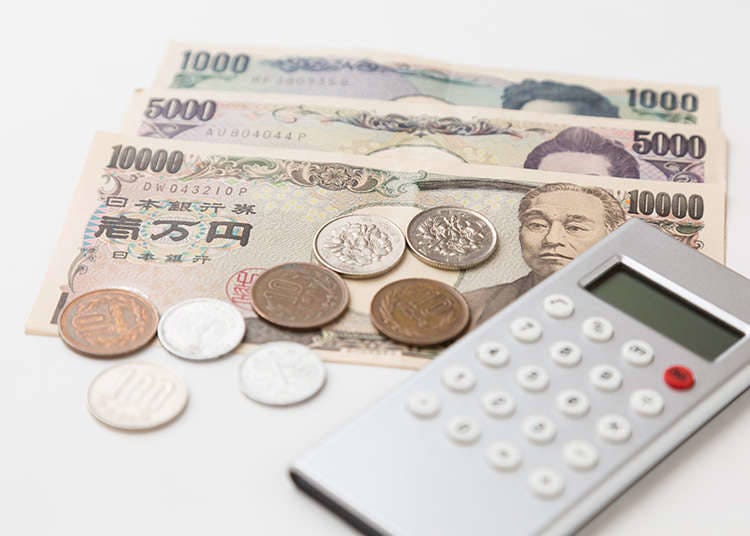
Next is the Declaration of Carrying of Means of Payment form. When departing or entering Japan, you will need to declare if you carry cash exceeding one million Japanese yen or its equivalent in total. This includes cash, checks, and gold of more than 90% purity. However, the procedures might be different depending on quantity, so please ask a customs official if you are unsure about what to declare.
- Category Other Sightseeing
- How To: Customs Procedures and Regulations
Share this article.

Recommended places for you

Osaka JOINER
Other Sightseeing
Namba, Dotonbori, Shinsaibashi

Kamesushi Sohonten
Umeda, Osaka Station, Kitashinchi

ISHIDAYA Hanare
Kobe, Sannomiya, Kitano

Rukku and Uohei
Sapporo / Chitose

Jukuseiniku-to Namamottsuarera Nikubaru Italian Nikutaria Sannomiya

Yoshida Gennojo-Roho Kyoto Buddhist Altars
Nijo Castle, Kyoto Imperial Palace

Visiting Japan in September - The Best Things to Do and Reasons to Visit
by: James Davies

Savor the Season: Muscat Grape Afternoon Teas to Try in Tokyo This Fall

Japanese Insect Repellent for Adults and Kids – Drugstore Staff Recommend Gentle and Effective Products
by: Cassandra Lord

Taste the Season: 6 Cozy Fall Afternoon Teas to Enjoy at Tokyo Hotels (2024)

Discover Tokyo’s Best-Kept Secret: The Allure of Sento Baths

Travel Smart: 10 Essential Disaster Prep Items from Japanese Convenience Stores
by: Miyu Shimada

Visiting Japan's Miffy Cafe Will Make Your Heart Melt (Photos)

50% Off Shinkansen Tickets?! 'Osakini Tokudane Special' Has Been Extended – Now for Gran Class Too!

Iizaka Onsen Guide: Japan's Gorgeous Hidden Hot Springs Town! (Access, Things to Do, Ryokan)

Bus & Shinkansen: Tokyo to Osaka Ultimate Transport Guide

Tokyo’s No. 1 Free Observation Deck: 360° Panoramic Views From These Downtown Skyscrapers!

Annual Survey Reveals Most Attractive Prefectures in Japan
- #best sushi japan
- #what to do in odaiba
- #what to bring to japan
- #new years in tokyo
- #best ramen japan
- #what to buy in ameyoko
- #japanese nail trends
- #things to do japan
- #onsen tattoo friendly tokyo
- #best coffee japan
- #best japanese soft drinks
- #best yakiniku japan
- #japanese fashion culture
- #japanese convenience store snacks

Entering Japan
Below is a basic introduction to the Japanese immigration system. Contact your closest Japanese embassy or consulate outside Japan or an immigration bureau inside Japan for official advice.
All foreigners, including foreign residents, get fingerprinted and photographed upon entering Japan as a measure aimed at preventing terrorism and other illegal activities. Excluded from this procedure are persons under the age of 16 and a few special groups, such as diplomats and visiting dignitaries.
All foreigners receive a status of residence when entering Japan. There are more than twenty statuses of residence, including "temporary visitor" for tourists, and a range of statuses for students , workers and relatives of Japanese nationals and residents.
If you are a citizen of one of the over 50 countries with which Japan has a "general visa exemption arrangement", you need only a valid passport to enter Japan as a "temporary visitor". Otherwise, you need to obtain a visa before entering the country. Temporary visitors from most countries are allowed to stay for up to 90 days.
If you are a citizen of Austria, Germany, Ireland, Liechtenstein, Mexico, Switzerland or the United Kingdom, you have the possibility to extend your stay to a total of up to six months. You still initially enter Japan on a 90 day permit, but can then apply for an extension at an immigration bureau in Japan.
Visitors to Japan are encouraged to use Visit Japan Web to digitally submit immigration and customs-related information ahead of their arrival for a smoother entry into the country without the need to fill out paper forms. The system can be used to also create a tax exemption QR code for an enhanced tax-free shopping experience.
Temporary visitors are not allowed to engage in any paid activities. However, short term studies at Japanese language schools are permitted.
All foreign tourists in Japan are required to carry their passports with them at all times.
Longer stays for the wealthy and digital nomads
If you are a citizen of one of the over 50 countries with which Japan has a "general visa exemption arrangement" and have savings of over 30 million yen, you and your spouse may qualify to stay in Japan for up to one year for the purpose of sightseeing and recreation. Likewise, professionals with an annual income of over 10 million yen may qualify to work remotely from Japan for up to six months. Respective visas (for "long-term residents for sightseeing/recreation" or "digital nomads") have to be obtained before traveling to Japan.
White-collar work
Foreigners who wish to work in Japan need to get a work visa from a Japanese embassy or consulate outside of Japan to enter the country on a status of residence permitting work.
There are over a dozen such statuses of residence, each allowing the holder to work only in a specific professional field, for example, journalism, arts, research, education, engineering, entertainment, business management, international services, etc. If you change jobs while you are in Japan and your new job falls into a different professional field (e.g. from education to engineering), you will need to change your status of residence.
A university degree or considerable professional experience in the applicable field is required to qualify for most work visa types. Most also require you to have a prospective employer as a sponsor. Residence permission is granted in periods of 4 months to 5 years and is extendable.
Workers may bring their spouses and children to Japan on a dependent visa. Dependents are not allowed to engage in any paid activities unless they get permission from the immigration office, but even then, they may work only a set maximum number of hours per week.
Other work and trainees
The so-called "Specified Skills" status allows for work in one of over a dozen professional fields, including construction, hospitality, nursing and manufacturing. Applicants do not need a degree but have to pass a technical skills test and know some Japanese. There are two types: Type 1 allows workers to stay in Japan for up to five years, but they may not bring their family. Type 2 is for more highly qualified workers, can be extended indefinitely and allows for the family to live in Japan. Type 1 holders may upgrade to type 2 after five years.
Furthermore, there is the "Technical Intern Training Program", which lets foreign workers acquire skills at a workplace in Japan that they could not otherwise acquire in their home countries. After a few years, participants become eligible to switch to the above-mentioned "Specified Skill" type 1 status. Most trainees come from South East Asia.
Working holidays
This is a special visa type that allows some paid activity for citizens of Australia, Canada, Denmark, Germany, France, Ireland, Korea, New Zealand, the United Kingdom and a few other countries between the ages of 18 and 30. Consult the working holiday visa page for details.
Foreigners who wish to study in Japan (except for short term studies at language schools ) need to get a student visa at a Japanese embassy or consulate outside of Japan in order to enter the country on a status of residence that permits long term studies.
Sponsorship from an educational institution in Japan and proof of sufficient funds to cover all your expenses during your stay are required to qualify for a student visa. Residence permission is granted in periods of between 3 months and 4 years and 3 months and is extendable.
Students must not engage in paid activities unless they get permission from the immigration office. Even then, students may work only a set maximum number of hours per week.
Foreigners who are married to a Japanese national or to a permanent resident of Japan can obtain a spouse visa, which allows them to engage in any paid activity in Japan. Residence permission is granted in periods of 6 months or 1, 3 or 5 years and is extendable.
Staying in Japan
Inside Japan, most immigration-related matters, such as extending residence permission or changing the status of residence, are handled by the Immigration Services Agency, which has bureaus across the country.
Residence card
All new foreign residents are issued a residence card (zairyu card) upon initially entering Japan at Narita , Haneda , Kansai or Chubu airports. New residents arriving through different ports can get their cards at their municipal offices.
The residence card is an important document required for opening a bank account , obtaining a cell phone , converting a drivers license and similar activities. It stores the holder's personal information, including the current address, the status of residence and period of stay. Foreign residents are required to carry their residence card with them at all times.
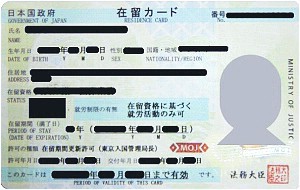
Extending residence permission
Most statuses of residence allow you to stay in Japan for a period between three months and five years. If you wish to stay longer, you must apply for an extension at an immigration bureau inside Japan before the expiry date of your current residence permission.
The application process is relatively simple, provided that you still fulfill the conditions for the specific status of residence. It typically takes a couple of days or weeks for the application to be processed, and you are allowed to remain in Japan during that time even if your previous residence permission expires in the meantime.
Changing status of residence
It is possible to change your status of residence (e.g. from instructor to arts or from student to engineer) at an immigration bureau inside Japan. You will have to provide similar documentation as you would when applying for a new status of residence at an embassy or consulate outside of Japan.
Re-entry permits
Foreign residents who wish to temporarily leave Japan for longer than a year, need to get a re-entry permit before departing Japan; otherwise, they lose their status of residence. Re-entry permits can be obtained at immigration offices in Japan. For absences of less than one year, re-entry permits are not required.
Permanent residence
Foreign residents, who have shown good conduct and have sufficient assets or ability to make an independent living, can be granted permanent residence if they reside in Japan for a certain number of consecutive years. For highly-skilled professionals and spouses of Japanese nationals, the minimum amount of years is typically one to five years, while for others it is typically ten years. Permanent residence status is indefinite and allows for any paid activity.
Naturalization
Foreigners, who have resided in Japan for at least five consecutive years (less if married to a Japanese national), have shown good conduct, have never plotted against the Japanese government, have sufficient assets or ability to make an independent living and are willing to renounce any other citizenship held, can be granted Japanese citizenship.
Questions? Ask in our forum .
Links and Resources
A guide to japanese visas, japan customs, guide to the animal quarantine service, the ministry of foreign affairs, immigration services agency of japan.

10 Things to check before leaving 旅行の準備
- Published on : 12/10/2022
- Add to favorites

© White.Rainforest via Unsplash
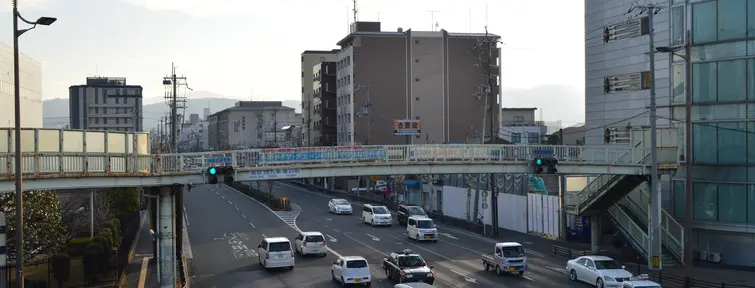
© Vaea Garrido via Unplash
Travel Checklist
Your trip to Japan is coming up and you want to be sure you do not forget anything? Here is a checklist of the 10 essential things to prepare before the big departure!
Conditions for entering Japan
1. Have a valid passport : to travel to Japan, a valid passport is required! 68 countries in the world are exempt from the visa requirement for a tourist stay of less than 90 days, but a tourist visa may be required for nationals of other countries. As tourist journeys are limited to 3 months in Japan, make sure you have a valid passport until the end of your stay.
Good to know: For stays of more than 90 days, a visa is required.
2. Have a return air ticket: as the visa-free travel period is limited to 90 days, Japanese legislation requires you to have a return plane ticket in order to enter Japan.
3. Have a local address: this is one of the conditions for entering Japan. You must provide an address in Japan, to be completed on the customs declaration on arrival. You only need to enter the address of your first accommodation in Japan, whether it is a hotel , a ryokan or a rental house . To gain some time, remember to prepare it in advance.
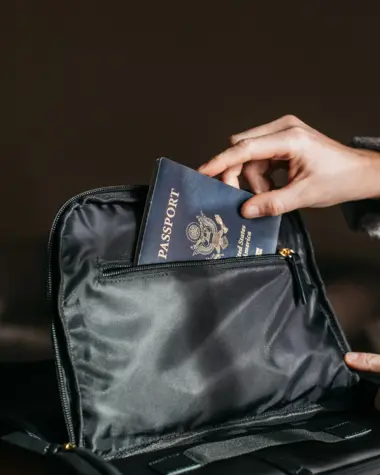
©Vinta Supply Co. | NYC, pexels

©Samuel Berner, unsplash
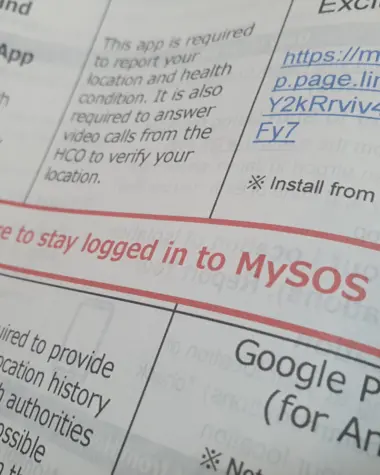
MySOS application
©Syced, Wikimedia
4. Register on the Visit Japan Website : this website manages the arrival and departure procedures in Japan (customs, immigration). It also allows you to enter your Covid-related documents (vaccination certificates or PCR tests).
The essential elements to be planned
5. Have cash (yen): although credit cards are widely accepted in Japan, most everyday transactions are still done in cash, and small shops and restaurants do not accept cards. Make sure you have some cash in your pocket when you arrive!
If you were unable to get cash before departure, you can withdraw money from ATMs in all Konbinis. It's convenient, there are ATMs everywhere, but a commission is charged for each withdrawal. Therefore, use large denominations.
6. Plan an internet connection: Plan an internet connection: optimize your trip and travel more peacefully by having an internet access. Whether you rent a pocket Wi-Fi or buy a sim card , keep a connection in all circumstances!
7. Have an adapter: to be able to recharge all your devices, don't forget to take an adapter with you before you leave. Japanese plugs are different from French ones: they are type A, i.e. with two parallel flat pins (JIS C 8303, class II)!
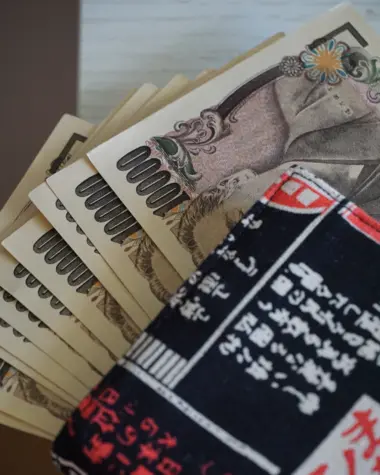
©jun rong loo, unsplash

Pocket Wi-Fi
©sakaki0214, flickr

©Gene Brutty, unsplash
8. Buy a Japan Rail Pass : although it is possible to travel without it, it is the best option if you want to travel by train in Japan and discover various cities. It will already be worth it with a Tokyo/Kyoto round trip.
The Japan Rail Pass allows you to have unlimited travel on the Japan Railways network for 7, 14 or 21 days! However, the Japan Rail Pass cannot be bought in Japan. So, for more peace of mind, you can order it in advance here and receive it at home before your departure.
9. Check the festival calendar: one of the attractions of traveling in Japan is the thousands of local festivals, the famous matsuri, which punctuate the life of each locality. Be sure to check out the matsuri in the cities you visit for a memorable experience!
10. Plan your trips: Japanese transport is managed by a multitude of local and private companies. Before leaving, check your different itineraries and the companies to use, the Japan Rail Pass not being valid everywhere!
Latest Articles
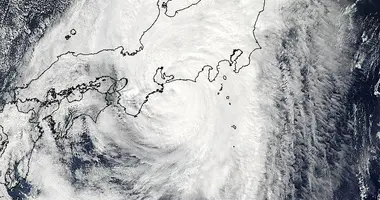
Typhoon season in Japan
Different names are used across the world when talking about tropical cyclones. In the North Atlantic region, we call them hurricanes. In Asia, the term used is typhoon.

Residence Card Zairyu Card: Your Essential Guide to Living in Japan
The Residence Card, also known as Zairyu Card (在留カード), is a crucial document for non-Japanese residents living in Japan.
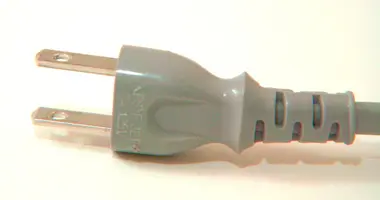
Electrical outlets in Japan: everything you need to know for your trip
When you're planning your trip to Japan, you often think about booking your plane tickets and accommodation, and drawing up your itinerary...
All the themes of the city

Travelling in Japan: a comprehensive guide

Japanese Food and Drink

Books on Japan

Japanese Movies

Japanese Language

Japanese History

Understanding Japan
Please select your country on the list below:
- Switzerland
- United Kingdom
- Other countries
Entry and Exit
Most frequently asked questions.
- What is the border inspection process for entering Japan? First fill out an entry card, which can be obtained on the airplane or at the custom desk. Use the foreigner passage and be ready to answer questions from custom officer regarding the duration, reason, and schedule for your visit. As of now, fingerprints are required from foreign visitors.
- What to pay attention to when going through custom? After getting your luggage, you need to go through custom. For traveler without any taxable item, they can use the green passage. Otherwise, they will need to use the red passage. Everyone must submit a baggage declaration form.
- What is prohibited from bringing into Japan? Drug such as marijuana and opium, drug-related apparatus, guns, bombs, explosives, gunpowder, chemical weapons, and books and CD with pornographic or counterfeiting content are all prohibited from entering the country.
- What is the difference between tax-free and tax refund? Tax free product has a net price after deducting tax. Product with tax refund, on the other hand, allows customers to re-claim tax after paying the total. For a tax refund, you will be refunded on value-added tax and consumption tax. When you purchase a tax free product, you get exempted from import tax. Many products in Japan have very little import tax if any, so tax exempt or tax refund usually refers to consumption tax.
- How much do I need to spend to qualify for tax free? Since the implementation of the new tax policy in 1 July 2018, any purchase, on common goods or consumables, over 5000 yen qualifies for tax free. Consumables include food, beverages, alcohol, pharmaceuticals, cosmetics, etc.
- What is the process on getting a tax refund? In Japan, there are two ways to get a tax refund. One method is to get tax deduction at checkout counter by showing your passport. Another method is to first pay with tax, and then get a tax refund at a designate counter within the same day of purchase by showing your purchase, receipt, and passport.
- How do I get a tax refund after paying with tax? You can claim a tax refund at designate counter or service center. You will have to show your purchase, receipt, and passport. After signing any required document, the tax will be returned to you in cash. If you pay by credit card, the tax can also be refunded to the credit card.
- Kawa Travel Date:September. 15th 2024 Travel Route: Tokyo-Osaka 9-Day Tour by Private Van Osaka September 2024-Wish I had known about this company before 2024. My wife and I have had our fair share of train rides with multiple transfers, crowded train stations and trains packed like sardines over the years. Going with family including 3 children in 2024 was going to be a lot harder and more stressful. Japan Holidays limousine service is very reasonably priced and will save you so much time with less stress versus trying to navigate the Japan train system and taxi service with 9 persons. As a bonus, everyone got to take a nap during the hour long drives. Ms. Mori promptly responds to emails and driver Mr. Yin was a very nice and accommodating driver. We had him for 2 days for day trips to Nara and Himeji. On our way back to Osaka, he dropped us off at his favorite ramen shop on the first day and an out of the way store at our request on the second day. He also gave us directions to 2 additional out of the way stores that we wanted to go to that were nearby. The time we saved and the convenience of being picked up after is well worth the cost and we will definitely use Japan Holidays limousine service on our return to Japan.
- Cheryl Lum Travel Date:July. 30th 2024 Travel Route: Hokkaido Minibus Service Good experience with Booking private mini bus for my family of 14 pax. Driver was experienced and overall we are very satisfied. A great customer experience! Even though we booked abit last minute but Lydia and her team managed to arrange for a comfortable and smooth journey to our resort! Driver was very prompt and accommodating even when we changed the timetable of our visit a little bit. Communication was not an issue thanks to google translate. Excellent service and communication from start to finish. The scheduling team was easy to work with and they were able to set up transportation for my family for a day trip outside of the normal for transportation. The driver was friendly and on time and made the trip a breeze. Thank you for all your help!
- Alexa Travel Date:July. 30th 2024 Travel Route: Hakone Day Tour from Tokyo This entire company is amazing. The level of communication was impeccable and the drivers were beyond nice. We saw absolutely everything on our list in Japan because of them! If you are thinking about using them 100% do it! My family and I took an 8/9 hours transportation/tour of Hakone with Japan Holiday, and they were amazing! Our driver was very gentle, helpful and thoughtful :) we were traveling with an infant and elderly parents, and he would inform us if the weather seemed colder and that he would wait nearby if we wanted to run back into the car quickly, or he would head over to the restaurants/tea house to check if they were open before letting us out. Really appreciated it! Also, James was very responsive and helpful when coordinating our travels prior to the trip. Thanks so much and would definitely book again when we need a tour/transport!
- Nicholas Travel Date:Juyy. 8th 2024 Travel Route: 1-day round trip between Tokyo and Mount Fuji Excellent service and communication from start to finish. The scheduling team was easy to work with and they were able to set up transportation for my family for a day trip outside of the normal for transportation. The driver was friendly and on time and made the trip a breeze. We booked a 1-day round trip for 5 people between Tokyo and Mount Fuji and we are extremely satisfied with the service. The booking process is easy through emails. We paid through Paypal in advance and that was the only payment needed. No hidden fees or extra charge. We were notified about the details of the driver the day before the trip. The driver, Mr. Itami-san, showed up on time at our hotel. The car was clean and comfortable. Mr. Itami-san speaks fluent Mandarin and Japanese; he is knowledgeable about the area. We went to Oishi Park and Oshino Hakkai and had to travel back to Tokyo at 3:30pm-ish due to heavy traffic. I suggest to stay a night around Mount Fuji area if you have time and would like to better enjoy the majestic views. I highly recommend Japan Holiday to anyone who wants to travel in Japan through private transportation.
- Lalisa Travel Date:May. 27th 2024 Travel Route: Hokkaido 5-Day Tour by Private Van Was recommended this company by a family member for their previous trip in Hokkaido. Super easy to communicate with via email, and arrangements were good. The driver cum tour guide was Robin who recommended us a lot of food and places to go while we were in Hokkaido. Great experience. Day trip to Biei. Driver was very safe and polite. She was professional and able to guide/explain about sapporo. It was snowy and Safety is the upmost important. The staff members were quite helpful especially Melinda who kept communicating with me. They work really quickly to finalize our vacation. Additionally, the driver communicates effectively. We had to stop in several places, but he made it all happen. Highly recommend booking from them.
🙌 Awesome, you're subscribed!
Thanks for subscribing! Look out for your first newsletter in your inbox soon!
Get us in your inbox
Sign up to our newsletter for the latest and greatest from your city and beyond
By entering your email address you agree to our Terms of Use and Privacy Policy and consent to receive emails from Time Out about news, events, offers and partner promotions.
- Things to Do
- Food & Drink
- Shopping & Style
- Coca-Cola Foodmarks
- Restaurants & Cafes
- Music & Nightlife
- Neighborhoods
- Los Angeles

Everything to know about Japan’s re-entry rules for foreign residents
Re-entry confirmation letters no longer necessary, but you’ll need a negative Covid-19 test before entering the country

It’s been a long and arduous process for foreign residents in Tokyo and Japan during the Covid-19 pandemic, however it seems like re-entry is becoming a smoother process. Even if you’re not part of Japan’s travel bubble or a business traveller – who have separate entry processes of their own – foreign residents are now allowed to leave Japan and re-enter the country. Sure, you’ll have to jump through hoops, but it’s not impossible. Planning on travelling? Here’s the latest on Japan’s re-entry rules for foreign residents.
RECOMMENDED: Keep up-to-date with the coronavirus situation in Tokyo and Japan here
What are the latest entry restrictions?
Currently, travellers and tourists from 152 countries and regions are being denied entry into Japan.
From December 28 2020 to the end of January 2021, Japan is banning all international travellers from entering the country – excluding Japanese citizens and foreign residents with re-entry permits. You still must provide official proof of a negative coronavirus test (taken 72 hours before departure) and must currently hold residency in Japan. From December 28 2020 to the end of January 2021, Japan is no longer issuing new visas .
Those who stayed in the United Kingdom or South Africa within 14 days prior to their arrival in Japan are now required to submit a new pledge .
What is no longer required to enter Japan?
Since the start of the pandemic, Japan has reversed many of their previous requirements. Here is what is no longer required to re-enter the country:
- Foreign residents, with valid residence status, are no longer required to obtain ‘Letter of Confirmation of Submitting Required Documentation for Re-entry into Japan’ or ‘Receipt for Request of Re-entry’ when re-entering Japan.
- As of November 1 2020, foreign residents leaving Japan are no longer required to share their travel itinerary with the Immigration Services Agency (ISA) or provide a re-entry confirmation letter before departing Japan. Proof of ‘exceptional circumstances’ is also no longer required to re-enter Japan.
What should I do before departing Japan?
Before leaving Japan, double check with your destination’s embassy and your airline to see if you need to provide a negative test result upon landing. If you do, you can book a Covid-19 test for travel at these clinics in Tokyo (or Osaka). Before flying, monitor your health for 14 days – if you show any coronavirus symptoms , you should cancel your trip.
Airlines and airports also have a strict requirement for travellers to wear a face mask. Note that face masks with exhalation valves or vents are not considered proper facial protection. If you’re planning on re-entering Japan, you will receive a re-entry permit at the airport. There is no need to apply for one in advance.
When you book your return flight to Japan, make sure you have enough time to take a coronavirus test up to 72 hours before.
What should I do before flying back to Japan?
In order to re-enter Japan, you will need proof of a negative Covid-19 test taken up to 72 hours before departure. The Ministry of Foreign Affairs provides a sample document for the doctor or medical institution to fill out and sign. Note that the document and information must be in English . It’s also possible the airline staff will ask to see proof of a negative test result, so make sure it’s in your carry-on luggage.
According to The Japan Times , the following types of tests are accepted: RT-PCR or Lamp tests using a nasopharyngeal swab or saliva samples, or an antigen test using the chemiluminescence enzyme immunoassay (CLEIA) method.
What are the rules after arriving in Japan?
Once you arrive at the airport, you will present your negative test document to a quarantine officer. You will also be required to take a free Covid-19 test at the airport.
After you have tested negative, you will submit a written pledge promising to self-isolate for 14 days at your home or place of residence and stay out of public transportation, including taxis. You will also need to download the Ministry of Health and Welfare’s Covid-19 tracking app Cocoa .
When you leave the airport you will not be allowed to take public transportation. Here is a list of available transportation options for those leaving the airport.
Breaking quarantine now has serious consequences . Starting January 14 2021, foreign residents who break quarantine could have their full names released to the public and their residency status revoked – which can result in deportation.
Do note that these rules may change depending on the coronavirus situation. For the most recent information, see the Ministry of Foreign Affairs website .
Stay protected and informed
Where to get a covid-19 pcr test and travel certificate in tokyo.
- Things to do

These medical centres in Tokyo (and Osaka) offer testing and certificates for international travel
Google now offers Covid-19 forecasts for Japan

The 28-day projections in English and Japanese include coronavirus case numbers and deaths by prefecture
How to go out safely in Tokyo, plus social distancing rules explained

Everything you need to know about protecting yourself (and others) while going out and about in Tokyo
[image] [title]
Discover Time Out original video
- Terms of use
- Work for Time Out
- Time Out Group
- Advertising
- Modern slavery statement
- Manage cookies
Time Out Tokyo
- Magazine subscription
- Digital edition
- Buy the guide to Tokyo
Time Out products
- Time Out Worldwide
- Media & Industry
- Meetings & Events
- Select Language 简体中文 繁體中文(香港) 繁體中文(臺灣) India (English) Bahasa Indonesia 한국어 ภาษาไทย Tiếng Việt Singapore (English) Philippines (English) Malaysia (English) Australia/New Zealand (English) Français Deutsch Italiano Español United Kingdom (English) Nordic countries(English) Canada (English) Canada (Français) United States (English) Mexico (español) Português العربية Japan(日本語) Global (English)
- India (English)
- Bahasa Indonesia
- Singapore (English)
- Philippines (English)
- Malaysia (English)
- Australia/New Zealand (English)
- United Kingdom (English)
- Nordic countries(English)
- Canada (English)
- Canada (Français)
- United States (English)
- Mexico (español)
- Global (English)
- Fujiyoshida
- Shimonoseki
- Ishigaki Island
- Miyako Island
- Kerama Island
- Tokyo Island
- Koka & Shigaraki
- Hida Takayama
- Ginza, Nihonbashi
- Beppu & Yufuin (Onsen)
- Ginzan Onsen
- Nagasaki Islands

- Kumano Kodo
- Shikoku Karst
- Amami Oshima
- Hachimantai
- Omihachiman
- Aizuwakamatsu

- Diving in Japan
- Skiing in Japan
- Seasonal Flowers in Japan
- Sustainable Outdoors
- Off the Beaten Track in Japan
- Scenic Spots
- World Heritage
- Home Stays & Farm Stays

- Japanese Gardens
- Japanese Crafts
- Temple Stays
- Heritage Stays
- Festivals and Events
- Theater in Japan
- Japanese Tea Ceremony
- Cultural Experiences in Japan
- Culture in Japan

- Local Cuisine Eastern Japan
- Local Cuisine Western Japan
- Local Street Food
- Japan's Local Ekiben
- Japanese Whisky
- Vegetarian and Vegan Guide
- Sushi in Japan Guide
- Japanese Sake Breweries

- Art Museums
- Architecture
- Performing Arts
- Art Festivals
- Japanese Anime and Comics
- Japanese Ceramics
- Local Crafts

- Scenic Night Views
- Natural Wonders
- Theme Parks
- Samurai & Ninja
- Iconic Architecture

- Wellness Travel in Japan
- Japanese Ryokan Guide
- A Guide to Stargazing in Japan
- Relaxation in Japan
- Forest Bathing (Shinrin-yoku)

- Experiences in Japan
- Enjoy my Japan
- National Parks
- Japan's Local Treasures
- Japan Heritage
- Snow Like No Other
- Wonder Around Japan

- Visa Information
- Getting to Japan
- Airport Access
- COVID-19: Practical Information for Traveling to Japan
- Anime Tourism
- Countryside Stays
- Accessible Tourism
- Hokkaido Great Outdoors
- Scenic World Heritage in Tohoku
- Shikoku’s Nature and Traditions
- Southern Kyushu by Rail

- Traveling by Rail
- How to Travel by Train and Bus
- JR Rail Passes
- Scenic Railways
- Renting a Car
- Sustainable Travel in Japan
- Travel Brochures
- Useful Apps
- Online Reservation Sites
- Eco-friendly Accommodation
- Luxury Accommodations
- Traveling With a Disability
- Hands-free Travel
- How to Book a Certified Tour Guide
- Volunteer Guides
- Tourist Information Center

- Japanese Manners
- Spring in Japan
- Summer in Japan
- Autumn in Japan
- Winter in Japan
- Cherry Blossom Forecast
- Autumn Leaves Forecast

- Japan Visitor Hotline
- Travel Insurance in Japan
- Japan Safe Travel Information
- Accessibility in Japan
- Vegetarian Guide
- Muslim Travelers
- Safety Tips

- JAPAN Monthly Web Magazine
- Arts & Cultures
- Nature & Outdoor
- Festivals & Events
- Insider Blog
- Things to do
- Local Guides
- Food & drink
- Traditional
- Hokuriku Shinetsu

My Favorites
${v.desc | trunc(25)}
Planning a Trip to Japan?
Share your travel photos with us by hashtagging your images with #visitjapanjp

FAQ Frequently asked questions about traveling to Japan
All information here is gathered from the relevant authorities. Due to the regularly changing situation, it is essential for you to always check and follow the latest guidance.
Last updated: Wednesday, May 31st, 2023
Before Departure
After arrival, did this information help you.
out of found this information helpful.
Thank you for your feedback.
Other useful information.
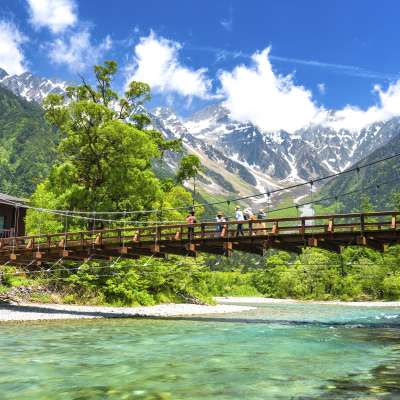
Please Choose Your Language
Browse the JNTO site in one of multiple languages
- Itineraries
- Tours and Activities
- Travel Guides
- Best of Japan
JRailPass.com » Japan Travel Blog » Japan travel restrictions and requirements for 2023
Japan travel restrictions and requirements for 2023
May 15, 2023
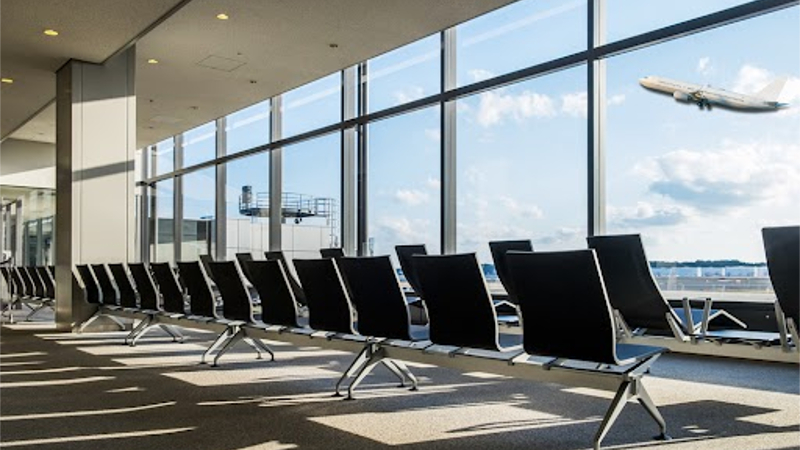
When planning a trip to Japan, make sure you know if there are any travel restrictions in place and any entry requirements you need to follow.
Japan has now completely removed all COVID-19 entry restrictions . Immigration rules have returned to normal from May 8, 2023 .
If you are thinking about traveling to Japan, you can check this regularly updated page and find out what you need to visit the country.
Below you’ll find information about the reinstatement of visa exemptions , vaccine and testing requirements, and other coronavirus measures in Japan.

Can I Travel to Japan Now?
Yes , Japan’s borders are now open to all international tourist travel.
You can easily travel to Japan by air or by sea as long as you meet the standard entry requirements.
Japan has completely removed the entry cap on daily foreign arrivals. All the usual visa exemptions currently apply to eligible visitors. This means that citizens of around 70 countries, including Australia, the United States and all European Union nations, can once again visit Japan for 90 days visa-free simply by using a valid passport.
Once in the country, train services are running as normal. You can use your Japan Rail Pass to travel around the nation at your leisure.
Japan Standard Entry Requirements
If you’re not a national of a visa-exempt country , you’ll need a visa to travel to Japan.
You should also make sure you have a valid passport , and other necessary documentation to enter the country.
If you have an e-Passport, you can use the Electronic Customs Declaration Gates (e-Gates) when arriving in Japan to clear border control.
Public transportation restrictions within Japan
Public transport, including trains, is operating in Japan. Travelers are advised to refer to Japanese train status updates issued by each individual operator to check if a service they plan to use remains affected by temporary Shinkansen COVID-19 restrictions.
Face masks are no longer required on JR trains or in most other places. They are still common and recommended, but are ultimately optional .
Who can travel to Japan now?
Anyone who meets the normal entry requirements can now travel to Japan.
All travelers should ensure they have a valid relevant visa for Japan (unless visa-exempt), a valid passport, and other necessary documentation to enter the country.
North Koreans cannot currently enter Japan due to sanctions. Apart from this, there are no other travel bans in place.
For further information about visas and visa exemptions, please check with the Japanese Ministry of Foreign Affairs at https://www.mofa.go.jp/ .
Rules for tourists
Individual tourists can now travel to Japan. There is no longer any need to book a place on a package tour.
Although mask use is not obligatory outdoors in Japan, it is still recommended in crowds or when having a conversation at close quarters.
Quarantine measures when traveling to Japan
There are currently no quarantine measures in Japan.
For further information, please check with the Japanese Ministry of Health at https://www.mhlw.go.jp/
Countries and regions banned to enter Japan
Only citizens of North Korea are currently prohibited from traveling to Japan. This is because the Japanese government has imposed sanctions on North Korea.
All other nationalities are allowed to visit Japan with the proper documentation. All travel bans due to coronavirus have now been lifted.
Travel advisories
Check the up-to-date travel advisories for Japan regarding COVID-19 from your country below:
- New Zealand
- United Kingdom
- United States
Health advice when visiting Japan
There are no specific health requirements in place for traveling to Japan.
Visitors are advised to have health insurance and be up-to-date on standard vaccinations. Recommended vaccines include:
- Chickenpox (Varicella)
- Diphtheria-Tetanus-Pertussis
- Flu (influenza)
- Hepatitis A
- Hepatitis B
- Japanese encephalitis
- Measles-Mumps-Rubella (MMR)
Japan’s Health Ministry has stated that the two most effective ways to curb the spread of illnesses like the coronavirus are to frequently wash hands and use a face mask when out in public:
- You should wash your hands with soap and water for at least 20 seconds, or use an alcohol-based hand sanitizer containing at least 60% alcohol.
- Face masks are recommended in public. The mask should cover your mouth, nose and chin, and be disposed of after a single-use.
If you are traveling to Japan with medication, make sure you bring copy of the prescription, a doctor’s note, and bring your medicine in the original container.
For the latest travel advisory and information about restrictions, please visit the Japan National Tourism Organization’s site .
The Japan National Tourism Organization has also set up a coronavirus hotline for tourist information available in 3 languages: English, Chinese, or Korean:
- From within Japan : 050 3816 2787
- If overseas : +81 50 3816 2787
Related posts
Related tours & activities.
- JAPAN ・English
- Help & Contact
International
- Shopping&Life
ANA Mileage Club
- SPECIAL ASSISTANCE
- Corporate Customer
Please select the card you wish to join
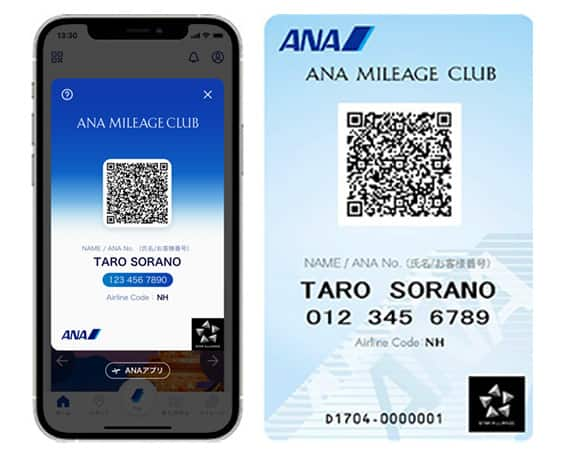
Get your digital card immediately No enrollment or annual fees ANA Mileage Club Card
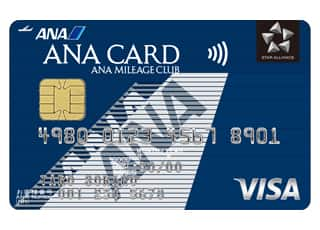
Earn more miles for your money With credit function ANA Card
What is the ANA Mileage Club?
- ANA Website
Immigration Information
Entry conditions and quarantine restrictions for each country.
Once you have specified search conditions, you can check the travel restrictions and required documents for each country. You will be redirected to the (external) Sherpa site, where you travel requirements will be consolidated. Please use the website in accordance with its terms and conditions.
Entry conditions and quarantine measures in each country are updated daily. The information published on Sherpa may not always be the most up-to-date and the language used may always not be the most appropriate. Before departure, please ensure you check the latest information from the embassy, consulate and health-related organizations for your passport country (nationality) and your destination. You may not be permitted to enter a country or you may be denied boarding if your travel documents are incomplete.

Search Conditions
Passport (nationality)
Tourism / Business
Point of departure/destination
Date range (length of trip)
Enter the name of the country (or city) for point of departure/destination.

ANA GROUP ANA GROUP
Official social media accounts.

For the 11th Consecutive Year, ANA Receives 5-Star Rating!

The Most On-Time Airline in the Asia Pacific for Five Consecutive Years!
- Privacy Policy
- Cookie Policy
- External Transmission of User Information
- Terms of Use
- System Requirement
- Web Accessibility Policy
- Conditions of Carriage for Domestic Flights
- Conditions of Carriage for International Flights
- Conditions of Carriage by Charter Flight
- ANA Mileage Club Terms and Conditions
Delete one character
Member Login
- Log In with Your AMC Membership Number
- ANA Biz Login
:Click on this icon to display the virtual keyboard.
- Before proceeding to log in, please be sure to read and accept the section on the purpose of using personal information in the ANA Privacy Policy .
About Logging In
Join ANA Mileage Club
Information for Members Logging In
- Points to note when using your AMC account.
Auto-Login with Cookies
By checking the Keep Me Logged In box on the login screen, you will not need to re-enter your membership number or password for subsequent logins.
- However, you will need to re-enter your password as a form of verification when making reservations, requesting awards, registering/revising personal information, and using other members-only functions.
Do you really want to log out?
- If you click "Log Out," you will be logged out even if you have selected "Save Login Status."
- Close all open browser windows if you want to quit your session without logging out.
ANA Biz is a business travel arrangement service.
Click here if you have forgotten your ID or password
Service Desk
Guidance of the diamond service
Guidance of the platinum service
Guidance of the bronze Service
Notices from ANA
View or update your profile, family usage.
Change address
Registration for mailed items
Change e-mail address
Change Password
Change your main card
List of your ANA Number
Reservation Information (Payment Method etc.)
Forgot your password?
Lost or damaged Card
Combining Mileage account
Change of Name
ANA Mileage Club Q&A
Award User Registration
Inheritance of Mileage
ANA Card Family Mile Registration
Edy Campaign Registration
Other(Procedures at the Service Center)
Membership Cancellation
Domestic Flights
ANA SKY COINS
Premium Point / Point on ANA /
View Mileage Account Balance
View ANA SKY COIN Balance
Choose your City and Language 都市・言語選択
Please enter your city and then choose the applicable option. 都市を入力後、選択してください
- 東京(全て)[TYO] / Tokyo(All)
- Assistance for Disabled Customers
- Help & Contact
- ANA Mileage Club Logout ANA Mileage Club Login / Join ANA Biz Logout ANA Biz Login
- Reservations

LikeJapan |ライクジャパン
JAPAN TRAVEL.LIKE JAPAN
Entering and Leaving Japan: Customs and Duties

Japan Customs
Tourists should be aware of the Japan customs procedures when entering or departing Japan. Upon your arrival to Japan, you need to hand in a Customs Declaration form for both your accompanied and unaccompanied baggage at the Customs Clearance. You may obtain the Customs Declaration forms on the plane, cruises or at the Customs office. Familiarize with Japan customs as you may be required to go through further procedures of passenger clearance .
Restrictions
Be aware of the restriction placed on duty-free allowances , exports and imports . Trade in ivory is strictly prohibited by both CITES and Japanese Law.
Since 2019, meat and animal products will be under inspection upon arrival. Therefore, if you are bringing meat or animal products into Japan, be prepared for the time-consuming inspection. For more details, you may refer to the Ministry of Agriculture, Forestry and Fisheries of Japan website .
Regional Customs at Major Airports
As there has been increasing number of international flights or ships at multiple airports, you may now find regional customs set up in Tokyo, Yokohama, Nagoya, Osaka, Kobe, Moji, Nagasaki, Hakodate and Okinawa. If you need more information on customs operations and the import and export-prohibited articles, feel free to visit any branch close to you. You may also find out more at the official page of the Japan Customs .

LikeJapan Editorial Team
See author's posts

What will you uncover?

- Create a DiGJAPAN! account
- Login with Facebook

- SIGHTSEEING
- TRAVEL INFO
SEARCH BY TAG
- SEARCH BY MAP
- INFORMATION
Entering and Leaving the Country

- 1.Passports and Visas
- 2.Entering the country
- 3.Leaving the country
- 4.Liquids on your flight
Passports and Visas

A passport is a form of personal identification issued by a national government. A passport is required to enter Japan. Check the expiration date on your passport before you go because Japan has certain entry requirements for the remaining validity of a passport.
Obtaining a passport
Each country has different procedures. Check the website of your country's immigration department.
Obtaining a visa
Nationals of some countries require a visa to enter Japan. A visa is a form of permission to enter the country. There are various types of visas including tourism and visit, business, work, and student. You must have a passport to obtain a visa. Once your visit has been finalized, apply for a visa early. For more details, visit the website of Japan's Ministry of Foreign Affairs .
Entering the country
Immigration procedures.

How to complete your embarkation / disembarkation card

a.Name b.Nationality c.Date of birth d.Last flight no. / Vessel e.Signature f.Sex g.Home address h.Occupation i.Passport number j.Last flight no. / Vessel k.Purpose of visit l.Intended length of stay in Japan m.Intended address in Japan
How to complete the customs declaration card

a.Basic information b.Check the items in your possession c.Check the appropriate box if you more than 1 million yen in cash or securities d.Check the appropriate box if you have unaccompanied articles, such as items sent by postal mail, etc. e.Signature f.Type and number of items in your possession
Information about major international airports in Japan
- Narita Airport
- Haneda Airport
- Kansai International Airport
- Chubu International Airport
- Fukuoka Airport
- Naha Airport
- Shizuoka Airport
- Ibaraki Airport
- New Chitose Airport
From airport to city center
Click here for modes of transportation from the airport to city center.
Leaving the country
Disembarkation procedures.

Liquids on your flight
Restrictions on liquids.

Any type of liquid in a container larger than 100ml cannot be brought on to a flight as a carry-on item. To bring liquids on board, they must be in a 100ml or smaller container and placed in a clear, resalable plastic zipper bag with a volume of 1 liter or less.
THIS ARTICLE IS BASED ON INFORMATION FROM 01 06,2016

- ABOUT DiGJAPAN!
- REGISTER AS A DiGJAPAN! MEMBER
- ABOUT THIS SITE
- PRIVACY POLICY
- TERMS OF SERVICE
© 2015 MAPPLE, Inc.
SEARCH BY AREA
The selected area will be displayed.
- HIROSHIMA(69)
- FUKUOKA(84)
- HOKKAIDO(272)
- OKINAWA(85)
- KUMAMOTO(70)
- KYUSHU(345)
- ASAKUSA(104)
- SHINJUKU(93)
- YOKOHAMA(99)
- KAMAKURA(78)
- Mt.FUJI(94)
- KANAZAWA(91)
- SHIRAKAWA_GO(3)
SEARCH BY CATEGORY
You may only select one.
Search by tag
- WORLD_HERITAGE
- TEMPLES/SHRINES
- 100 Yen Shop
- DEPARTMENT_STORES/MALLS
- MEAT_DISHES
- CAFE/SWEETS
Be sure to login to access all the features of the site!


Visit Japan Web: The Online Registration Before Arriving in Japan
Japanese customs: mysos replaced from november, 14, 2022.
During the Covid pandemic, entry procedures in Japan have changed a lot, which created some confusion. It is still somewhat the case after the reopening to tourism since October 11, even if a focus has been placed on easing the procedures especially through digitalization , to minimize human interactions and subsequent contamination risks.
Until recently, the Japanese government asked visitors to install specific app on their smartphones:
- MySOS, for advance registration of information regarding vaccine status / PCR test, for faster airport procedures in Japan (the "fast track" system)
- COCOA, an app to track contact-cases and infected persons, but it was discontinued in September 2022.
MySOS was not mandatory but highly recommended . Travelers who could not use the app were directed upon their arrival in Japan to a specific line in order to complete the necessary steps (showing a valid vaccination certificate / PCR test, etc.) which lengthened their time at the airport.
New website available since November 1st, 2022
In mid-October 2022, a new change in the procedure has been announced for all entry in Japan from November 14 included : every traveler (tourist, foreign resident and Japanese citizen alike) can register in advance on the Visit Japan Web site.
Visit Japan Web is a free, single portal to group formalities related to:
- Covid-19 🦠 ( quarantine , vaccination certificate, PCR test); The Pre-registration for Quarantine Procedures section collects the information that were previously filled in the MySOS app ("Fast Track" function);
- Immigration : the Disembarkation Card for Foreigner that was formerly handed in the plane ✈️ just before landing (does not concern Japanese citizens and foreign permanent residents);
- Customs 🛂 , with the Declaration of Personal effects and Unaccompanied Articles , to fill upon arrival, formerly either on a paper form or on the Japanese government’s Zeikan shinkoku app (税関申告アプリ).
In the facts, registering on the website has been possible since November 1, 2022 , for any arrival in Japan from November 14 in one of its largest airports:
- Tokyo -Narita,
- Tokyo-Haneda,
- Osaka - Kansai (KIX),
- Chubu ( Nagoya ),
- Fukuoka ( Kyushu ),
- New Chitose ( Hokkaido ) and
- Naha ( Okinawa ).
Travelers arriving in Japan before November 14, 2022, can still use the MySoS app to fill their Covid related data and are not the target of the Visit Japan Web.
1 blue screen and 2 QR Codes to show on a smartphone
Like with MySOS previously, each step of the registration process is ended by a change in the page display that includes:
- A blue screen , for a successful quarantine procedure registration,
- and the creation of 2 QR Codes for customs and immigration procedures.
Once all the steps are completed, a visitor’s smartphone 📱 will display first a blue screen, then 2 QR Codes to show at each checkpoint.
Starting April 29, 2023 , according to March 10 and April 26 latest announcements of the Ministry of Health, Labor and Welfare, some of the borders restrictions will be lifted and the Covid-19 quarantine procedure (blue screen) will not be required anymore .
It is highly recommended to register before departing for Japan : at the latest 6h prior to the flight’s departure, and ideally within the 10 preceding days , in order to allow time for the review of the submitted documents. Reviews are sorted by date of arrival in Japan . Visit Japan Web is available in English.
Whether you are fully vaccinated or not, consider using Visit Japan Web to make sure to board your flight to Japan, as airlines reserve the right to refuse passengers who may potentially be banned at the Quarantine Procedures step.
The necessary documents are:
- A valid email address (will be used as a user ID to each access to Visit Japan Web);
- Until April 29, 2023 , Covid vaccination certificate or negative PCR test result taken less than 72 hours before departure and translated in English (use the Japanese-English form provided by the Japanese Ministry of Health here );
- An address in Japan (for example, of the first accommodation you will be staying at).
If traveling with underage children , it is possible to register them on the same Visit Japan Web account (up to 10 travelers). Dependent or handicapped adults who cannot go through the procedures alone can also be registered in the Family members traveling with you section. However, each of them has to have their own passport or equivalent immigration document.
Each member of the family registered on the same account will also have their blue screen and 2 QR Codes, to show at checkpoints at the arrival airport in Japan.
Like with MySOS, registering with Visit Japan Web is not mandatory , however it helps going through the entry procedures in Japan faster, and reduces the hurdles of tedious formalities after 12 hours of more spent in a plane.
On April 5, 2023, Kono Taro, the Japanese Minister of Digital Affairs, announced that travelers are no longer required to show any document at arrival airport’s quarantine in Japan . However, filling information forms for immigration and customs is still a requirement.
Additional tips and advice
An Internet 📶 connection is required to use the Visit Japan Web site, especially to create the account, fill in the user’s information, and their family’s when applicable (name, passport number, etc.), the forms regarding vaccination or PCR test and create the first QR Code. The digital Disembarkation Card for Foreigners and custom procedures can be completed offline and the QR codes created upon arrival at the airport.
Creating a Visit Japan Web account is possible on a computer (Chrome browser is recommended) or on a smartphone (Chrome browser recommended on Android). In any case, before departure, make sure to be logged in only on the device you will use to travel (a smartphone ideally), and check that all information is up-to-date.
Questions asked at immigration and customs procedures are the same than on the paper forms. In any event, official Japanese sources (the Embassy of Japan or the Border Control page of the Japanese Ministry of Health for example) are the ultimate references regarding entry procedures in Japan and should be checked frequently.
- Flights and Airports
- Accommodation
- Transportation
- Internet & Phones
- Budget and money
- Japanese Food
- Visit with Kids
- Seasons: spring / summer / autumn / winter
- Weather forecast
- Time in Japan
- Holidays & Festivals
- Natural Disasters
- Customs and Duties
- Works and Closures
- September 16 -- Day of the elderly in Japan (Keiro no Hi - holiday)
- September 16 -- Tsurugaoka Hachimangu (Yabusame) Festival in Kamakura
- September 21 -- Autumn starts in Japan
- September 23 -- Autumn Equinox (Shunbun no Hi - holiday)
- From October 9 to 10 -- Hachiman Matsuri (the Autumn Takayama Festival)
- October 22 -- Jidai Matsuri Festival in Kyoto
- Tokyo : Shinjuku , Shibuya , Harajuku , Asakusa , Akihabara , Odaiba , Ikebukuro , Ueno , Roppongi , Chiyoda , Ryogoku ...
- Around Tokyo: Kamakura , Nikko , Hakone , Mount Fuji , Mount Takao , Yokohama ...
- Kansai: Kyoto , Nara , Osaka , Mount Koya , Himeji , Kobe , Kinosaki , Kumano Kodo , Ise ...
- Japanese Alps: Kanazawa , Matsumoto , Takayama , Shirakawa-go , Nakasendo ...
- West: Hiroshima , Miyajima , Shikoku , Onomichi , Naoshima , Izumo , Kurashiki , Matsue ...
- South: Kyushu , Okinawa , Yakushima ...
- North: Hokkaido , Tohoku ...

- Temples and Shrines
- Gardens and Parks
- Hiking and Trekking
- Observation Decks
- Public Baths (Onsen and Sento)
- Festivals (Matsuri)
- Amusement Parks
- Visit on a Budget / Luxury

Keikaku is a travel agency specialist of Japan and providing different kind of services:
- Japan Rail Pass
- English speaking Guides
- Pocket Wi-fi
- Japan Nightlife
- Working in Japan
- Religion and Spirituality
- Arts and History
- Movies / Animated Movies
- Japanese Music
- Studio Ghibli
- Photos / Videos
- Weird Japan
- Translations
- Kana & Kanji
- Japanese Swear Words
- Honorific Suffixes (san, kun, chan...)
- Introducing yourself
- Thank you / Apologize
- Count / Say Your Age
- Say the Date / Tell the Time
- Happy birthday
- Enjoy Your Meal
- Writing your name

Kanas are the much-needed basic characters of written Japanese language. Memorize them at a fast pace with our method.

Ask any kind of question and share your knowledge about Japan in Kanpai’s community space, our Q&A section Kotaete.

Isshoni means "together" in Japanese: share your trip details (dates, places you would like to visit) and find companions to travel in Japan.
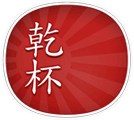
Create your Kanpai account to manage your profile and view your participation history (questions, answers).
Cookies on GOV.UK
We use some essential cookies to make this website work.
We’d like to set additional cookies to understand how you use GOV.UK, remember your settings and improve government services.
We also use cookies set by other sites to help us deliver content from their services.
You have accepted additional cookies. You can change your cookie settings at any time.
You have rejected additional cookies. You can change your cookie settings at any time.
Entry requirements
This information is for people travelling on a full ‘British citizen’ passport from the UK. It is based on the UK government’s understanding of the current rules for the most common types of travel.
The authorities in Japan set and enforce entry rules. If you’re not sure how these requirements apply to you, contact the Japanese Embassy in the UK .
COVID-19 rules
There are no COVID-19 testing or vaccination requirements for travellers entering Japan.
Passport validity requirements
If you’re visiting Japan, your passport must be valid for the length of your stay. No additional period of validity is required. You need a blank page for your visa stamp.
Check with your travel provider that your passport and other travel documents meet requirements. Renew your passport if you need to.
You will be denied entry if you do not have a valid travel document or try to use a passport that has been reported lost or stolen.
Visa requirements
You can get a visa on arrival in Japan for tourism or business for up to 90 days. You do not need to apply before you travel.
If you need a multiple-entry visa, you must ask the immigration officials when you arrive.
If you want to stay longer, you can apply at your nearest immigration office for an extension for another 90 days. Your passport must be valid for the period of the extension.
For long-term stays or to work or study, you must meet the Japanese government’s entry requirements. Check which type of visa you need . It is illegal to work in Japan without the correct visa no matter how informal or temporary the work.
If you overstay your permission to remain in Japan, you risk arrest, detention and a heavy fine.
For residency information, see the Japanese Immigration Services Agency website and read about living in Japan .
Vaccine requirements
For details about medical entry requirements and recommended vaccinations, see TravelHealthPro’s Japan guide .
Customs rules
There are strict rules about goods you can take into or out of Japan . You must declare anything that may be prohibited or subject to tax or duty.
Taking food into Japan
It is illegal to bring meat products including sausages, bacon and ham to Japan without permission from the Japanese Animal Quarantine Service . Penalties include a heavy fine and prison sentence.
Whale meat is available in Japan but importing it into the UK and EU is illegal. If you import whale meat to the UK, you can get a fine of up to £5,000 and a prison sentence. Customs officers will seize the meat.
Taking money into Japan
Japan is still a predominantly cash-based society. You may have difficulty using credit and debit cards issued outside Japan. Cirrus, Maestro, Link and Delta cash cards are not widely accepted. Japanese post offices, 7-Eleven stores and JP Post Bank have cash machines that will accept some foreign cards during business hours.
Related content
Is this page useful.
- Yes this page is useful
- No this page is not useful
Help us improve GOV.UK
Don’t include personal or financial information like your National Insurance number or credit card details.
To help us improve GOV.UK, we’d like to know more about your visit today. Please fill in this survey (opens in a new tab) .

COMMENTS
If you need after-hours assistance in an emergency, please call 03-3224-5000 and ask to speak with the Embassy's duty officer. Emergency Contact Information for U.S. citizens. Emergency Preparedness for U.S. citizens in Japan. Sources of Help, including counseling services. Medical Assistance in Japan.
When entering Japan, the first step after landing at the airport is getting through customs and immigration. Foreign visitors are required to complete various procedures upon arrival. Since the spread of Covid-19 in 2020, following procedures and rules is extremely important to ensure a safe trip! Here we will introduce what you need to prepare before a trip as well as entry procedures as of ...
When carrying more than 1kg of gold bullion of 90% or more of purity into Japan, "Declaration of Carrying of Means of Payment, etc." must be submitted in addition to "Declaration of Accompanied Articles and Unaccompanied Articles". If the quantity and value of gold exceeds the scope of " Customs Clearance for Traveler's Baggage ...
Call us in Washington, D.C. at 1-888-407-4747 (toll-free in the United States and Canada) or 1-202-501-4444 (from all other countries) from 8:00 a.m. to 8:00 p.m., Eastern Standard Time, Monday through Friday (except U.S. federal holidays). See the State Department's travel website for the Worldwide Caution and Travel Advisories.
Entering the Country: Japan Customs Procedures. All visitors entering Japan need to fill out a Declaration of Personal Effects and Unaccompanied Articles form. Declaration forms are available at the customs inspection. If you are carrying cash over one million Japanese yen in cash, then you are required to fill out the Declaration of Carrying ...
Last updated: Wednesday, May 31st, 2023. Get ready for your dream trip to Japan! Japan is now open to travelers from all countries or regions! Those who enter Japan on or after April 29th 2023 are not be required to present a valid vaccination certificate or a Covid-19 negative test certificate.
If you are a citizen of one of the over 50 countries with which Japan has a "general visa exemption arrangement", you need only a valid passport to enter Japan as a "temporary visitor". Otherwise, you need to obtain a visa before entering the country. Temporary visitors from most countries are allowed to stay for up to 90 days.
A minimum spend of 5,000 yen is required. After leaving the customs, you will find the exit inspection office. Some airports may have facial- recognition gate, which automatically complete the exit procedure as you walk through the gate. Exit check. (a) Exit check through facial- recognition gate. Since July 2019, the Japanese government has ...
New entry of foreign nationals. Visa exemption arrangements were resumed on October 11, 2022. Please refer to 5.Lift of the suspension of visa exemption measures for more details. Suspension of visa validity under the border measures was also lifted on October 11, 2022.
Good to know: For stays of more than 90 days, a visa is required. 2. Have a return air ticket: as the visa-free travel period is limited to 90 days, Japanese legislation requires you to have a return plane ticket in order to enter Japan. 3. Have a local address: this is one of the conditions for entering Japan.
Negative Covid-19 test certificate. Many airlines and countries require travellers to show valid certification of a negative Covid-19 test from up to 72 hours prior to departure and/or arrival at ...
👃 PCR test before departure. In the same way as to travel in many other countries in the world, it is still mandatory for travelers aged 6 years and older to get a negative Covid test before departure, regardless of their vaccination status. The test must be made at the earliest 72 hours before the departure of the flight for Japan.. Important notice : you must fill in this specific ...
The main content of this channel contains the Japanese entry regulations, exit regulations, tax refunds, and other content. As long as you abide by the rules, entering and exiting Japan is usually hassle-free. Just remember to keep in mind the entry and exit regulations when you do travel to Japan. While in Japan, when you purchase at certain ...
All you need to know about entering, leaving and staying in Japan. Any foreign visitor entering Japan must have a valid passport for the duration of their stay, and all visitors must comply with the conditions of their visas. See below for information about the current visa requirements for Japan. Visa Information. If you have any further ...
Even if you're not part of Japan's travel bubble or a business traveller - who have separate entry processes of their own - foreign residents are now allowed to leave Japan and re-enter ...
For Travelers. Information in case of illness or injury. Official announcements from the Government of Japan. Answers to your questions about traveling to Japan and staying safe during COVID-19, including where to get help if you need it.
There are no specific health requirements in place for traveling to Japan. Visitors are advised to have health insurance and be up-to-date on standard vaccinations. Recommended vaccines include: Chickenpox (Varicella) COVID-19. Diphtheria-Tetanus-Pertussis. Flu (influenza) Hepatitis A. Hepatitis B.
Passport (nationality) Tourism / Business. Point of departure/destination. Connection. Date range (length of trip) *. Enter the name of the country (or city) for point of departure/destination. Information about PCR Tests for International Travel from or to Japan.
Japan Customs. Tourists should be aware of the Japan customs procedures when entering or departing Japan. Upon your arrival to Japan, you need to hand in a Customs Declaration form for both your accompanied and unaccompanied baggage at the Customs Clearance. You may obtain the Customs Declaration forms on the plane, cruises or at the Customs office.
Nationals of some countries require a visa to enter Japan. A visa is a form of permission to enter the country. There are various types of visas including tourism and visit, business, work, and student. You must have a passport to obtain a visa. Once your visit has been finalized, apply for a visa early.
Latest Japan Entry Requirements. Last updated 04 October 2023, 00:00 BST . Summary . Since October 2022, Japan is fully open without the requirement for a visa for most visitors and, since April 2023, vaccination certificates and pre-departure tests are no longer required either.Read on to find out more! Who is currently allowed to travel to Japan?
During the Covid pandemic, entry procedures in Japan have changed a lot, which created some confusion. It is still somewhat the case after the reopening to tourism since October 11, even if a focus has been placed on easing the procedures especially through digitalization, to minimize human interactions and subsequent contamination risks.. Until recently, the Japanese government asked visitors ...
Passport validity requirements. If you're visiting Japan, your passport must be valid for the length of your stay. No additional period of validity is required. You need a blank page for your ...